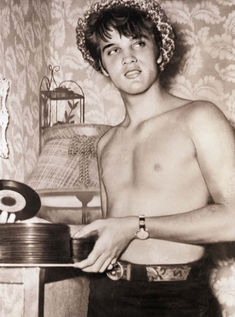Great Peace in Elvis’s Shadows.
Chapter 1 – Foundations
Elvis Aaron Presley was born in Tupelo, Mississippi, in 1935. The Presley family had few resources, but they gave each other all the more love. Elvis grew up as a son of the South, where family life and faith served as anchors. His parents, Gladys and Vernon, were always there for him and formed the heart of his existence. The warmth of home—simple family moments like eating together or laughing on the porch—formed the basis of who he was, much more so than all the glitz and cameras that would come later. Faith played a central role: Elvis was deeply religious from an early age and his roots lay in the Pentecostal movement. He saw his talent as a gift from God, meant to touch others. There was a lot of singing at home: gospel music was his first love, and that soul-lifting singing together continued to comfort and inspire him throughout his life.
Chapter 2 – Dreams and Ambitions
From childhood, Elvis was curious and thirsty for life. While others were content with what they knew, he was always hungry for the unknown. Musically, he experimented, combining the soul of blues with the warmth of country and the passion of gospel. Nothing kept him within the lines; he preferred not to follow trends—he created them himself. In addition to his musical quest, he also tried other paths: from crazy outfits to deep conversations about life and the afterlife. That experimental spirit was also evident in how he interacted with people. Elvis always wanted to see the good in people, even though he was occasionally disappointed in showbiz. Despite everything, he believed in the power of love, hope, and community. His fame often got in his way, but his curiosity kept him going, even in the wildest storms.
Chapter 3 – Challenges and Growth
Life sometimes threw significant obstacles in Elvis's path. Behind the bright lights of the spotlight, he struggled with the loneliness that fame can bring and the sadness that people don't always accept you for who you are. Trust was sometimes hard to find; people could seem friendly, but meanwhile they were mainly out for themselves. That hurt, but Elvis continued to believe in the good. Amidst the pressure—performances, recordings, endless schedules—he sought comfort in music, his faith, and above all, his family. When it all became too much for him, you wouldn't find him on stage, but at the kitchen table, praying or singing with his loved ones. His bond with his daughter and parents gave him resilience; family was the medicine for his soul. Sometimes he went under in life, but he always came back up, determined to keep going and take care of the people he loved.
Chapter 4 – Achievements and Influence
Elvis' greatest achievement went beyond gold records and sold-out venues. He broke down musical barriers by bringing genres together, creating a sound that united young and old, black and white, and brought a new musical wind. He gave the feeling—especially in his early days—that the world could be bigger and more exciting than many people thought. But what truly makes his legacy special is the way he used his fame to give hope to others. He gave generously, quietly supported people, and placed little value on boasting about his good deeds. Gospel concerts, spontaneous charity, sincere conversations with fans—he didn't do it for show, but because he felt it was his calling. His influence can still be felt today; you hear it in music, see it in fashion, and notice it in the zest for life he inspired in people all over the world.
Chapter 5 – Vision
Elvis viewed life as a quest for connection: with oneself, with others, and—perhaps most importantly—with something higher. Ultimately, he believed that inner growth was far more important than mere fame or wealth. He sometimes struggled with who he truly was, but he continued to search—for wisdom, silence, and moments of genuine joy. Despite his openness to change, he sometimes longed for peace—a balance that was difficult to find as an icon of his time. Yet he continued to learn, grow, and look ahead, always curious about what else life had to offer. Everything he did was based on the conviction: use your gifts to make the world a better place, support those you can support, and don't forget to be grateful. His legacy? Not just his music and fame, but above all his example of love, service, and the search for meaning in every note and every gesture. That is perhaps the deepest truth that Elvis Presley left us: happiness is not applause, but the warmth of family and the hope you give to others.





The king.